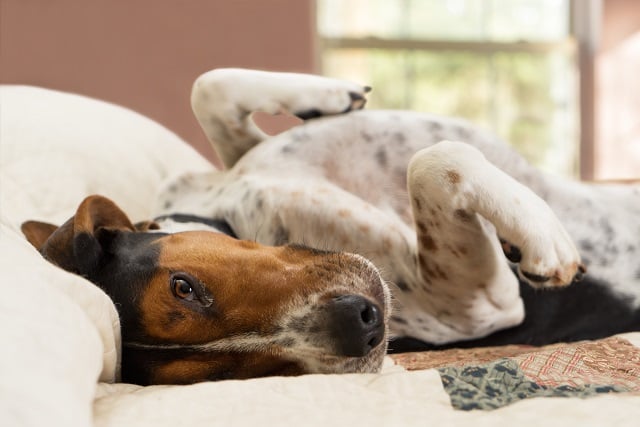
When we go to work or school and leave our pets for the day, many of us wonder just what we’ll come back home to. As soon as the front door closes, bored, stressed, nervous, young or curious pets start howling, chewing, peeing or clawing. If your cat or dog is untrained, it can mean destruction at home, trips to the vet, and plenty of frustration.
The saying “curiosity killed the cat” can, as many pet owners know, also apply to dogs. When they are left home alone, boredom or separation anxiety can kick in, and your pet might start to see shoes, rugs and furniture as something fun to play with. Other times, curiosity might take them exploring areas that could be dangerous, like a cabinet with cleaning products or a pantry with unhealthy foods. No to mention the potential mess of torn up clothing or trash. If you take precautions to make sure the house is safe and secure for your pet, you can be more confident that you’ll come home to few — if any — surprises.
If you find you must leave your pets alone, this guide gives you some important steps to take to help manage mischief and make he/she feel comfortable and safe.
Pet-Proofing 101
Your home doesn’t become a party pad once you leave. It’s the lack of supervision — whether you’re home or not — that sets the stage for destructive behavior. For your pets’ safety, you can dog-proof or cat-proof your home, anticipating areas and items that might become the focus of bored or destructive behavior and limiting their access. Since various kinds of animals are drawn to different things, we will break pet-proofing into three categories: dog, cat and both.
Dog-proofing:
- Keep away foods that are toxic to dogs by storing them on a high shelf or closed pantry.
- Make sure that none of your indoor and outdoor plants are toxic to your furry friends.
- Keep kitchen trash in a lidded (latching for large dogs) bin.
- Keep bathroom trash under the sink. You can find latches that keep curious creatures out of trash and any chemical containers you keep there.
- Keep dirty laundry off the floor and in baskets or a closet so that they aren’t tempted to chew or pee on them.
- Use baby gates to keep dogs from going up or down stairs, and close doors to rooms they shouldn’t be in without supervision.
- Keep all food and dishes picked up off end tables and other low areas a dog can reach.
- Put plastic covers over your stove and oven knobs if they are at a height where a dog’s front paws can reach when standing on their hind legs.
Cat-proofing:
- Keep the litter box clean to prevent your cat from urinating somewhere else.
- Drape blankets over furniture your cat likes to scratch, and place a scratching post nearby.
- Don’t leave liquids on counters, shelves or tables above electrical plugs.
- Purchase sturdy blinds that don’t bend easily, as well as window screens that are resistant to damage from cat claws.
House-proofing for dogs and cats:
- Keep all cleaning products, pet food and medications in secured containers out of reach.
- Organize all electrical cords, and keep them out of reach.
- Pick up small objects from the floor so pets won’t accidentally chew on them and choke.
- Make sure heavy objects, like televisions, are secured to the surfaces where they sit.
When you take the time to pet-proof your home, you can leave for the day with stronger peace of mind. However, even with all the boxes marked on your mile-long checklist, accidents can still happen. That’s why some pet parents prefer to take their pet-proofing a step further with pet security options.
Pet Security 101
No matter how long you’re gone or how far you go, making home security a priority puts many pet owners’ minds at ease. You can install smart home systems to keep your finger on the pulse of your home. You can even just make connections with a reliable neighbor who will check on your pets once or twice a day, or hire a pet sitter or a dog walker.
Indoor Cameras:
When it comes to making sure your pets — and your house — are safe, you can’t beat the assurance of an indoor security camera. Not only will indoor cameras give you a bird’s eye view of your pet while you’re away, it is also one of the most useful ways to protect your home.
What if a fire started, and for some reason, your alarm didn’t go off? What if burglars kicked in the door and then harmed your pets? When you install security cameras, your fears are calmed and pets protected. No matter where you are, you can head home to check on your pets, call a neighbor to help, or dial 9-1-1.
Security Systems:
Many home security systems now boast apps for Android and iOS devices, so you can keep an eye on your pets and your home right on your phone.
Many security systems are “smart,” meaning they are connected through the internet. You’ll get updates sent directly to your phone when the system detects smoke, carbon monoxide or a break-in. Many of these high-tech options will also alert 9-1-1, helping get rescuers to your home in minutes.
Some homeowners feel at ease with their dogs using a pet door. Not only can a pet door let dogs use the bathroom outside during the time you’re gone, but it can also give your pets a way to escape during a fire or home invasion. However, you’ll need to install a home security system that has the right sensors for a pet door, so the alarm isn’t triggered when they go in and out.
Neighbors, Pet Sitters and Dog Walkers:
If you have a responsible and trustworthy neighbor who is retired or works from home, you can ask them to help protect your dogs and cats by checking in for regular feedings, potty breaks, and maybe some playtime.
Run through your pet’s routine, feeding instructions, and other concerns. If the sitter can keep them on their regular schedule, it may help them to remain calm and prevent them from damaging your belongings. Cats are especially keen on a steady routine.
If your pet is too young, is too old, or has separation anxiety when you are away, hiring a pet sitter or dog walker can give you a peace of mind, as well as your pet some comfort and company during the day. Be sure to leave special instructions and vet contact information if your furry loved one has health concerns.
Stress-Free 101
If you’re leaving a dog home alone for any length of time, providing your dog with a stress-free zone is a fantastic way to give them a place to go to feel safe and secure when you’re away.
Like people, dogs find contentment in soft, comfortable areas, so don’t rely on your couch cushions to do the trick. Put a soft, plush dog bed in a room in the house you know they feel safe in — a place they go on their own for comfort, like a bedroom, bathroom or guest room.
Memory foam dog beds are great for older dogs, especially those with hip and joint issues. If you’ve crate trained your dog, then put the bed in their crate with some of their favorite toys. Regardless of where you put the bed, consider placing a shirt or blanket that smells like you in with the bed so that they can be comforted by your scent.
Cats, like dogs, also need a safe space to call their own. Cats like to hide in hard-to-reach, dark places, like the back of a closet or under a bed. Others may prefer a safe place to sunbathe while you’re away. Consider putting polyester blankets in places you think he/she will gravitate towards. This can both give them a warm bed and protect underlying things from accumulating fur. Rest assured the cat will find a comfortable place to curl up and will likely go to the same place often.
If your dog or cat is very high-stress, try purchasing a Thundershirt, which wraps tightly around their chest, creating a calming effect any time.
No matter how much you love them and want to be around them, you will have to leave your animals home alone at some point. It’s inevitable. Taking measures to keep them safe will also keep you sane.
Dogs and cats simply cannot tell us what they want. But when we pay attention, look ahead and make their comfort a priority, we’re almost certainly giving them what they need.
 How to Find the Best Neighborhood in Your City
How to Find the Best Neighborhood in Your City  11 Home Security and Safety Tips
11 Home Security and Safety Tips  Best Cities for Sidewalks and Winter Safety
Best Cities for Sidewalks and Winter Safety  Dining Room Sets
Dining Room Sets  Architectural Salvage
Architectural Salvage 

Are You Familiar With This Topic? Share Your Experience.